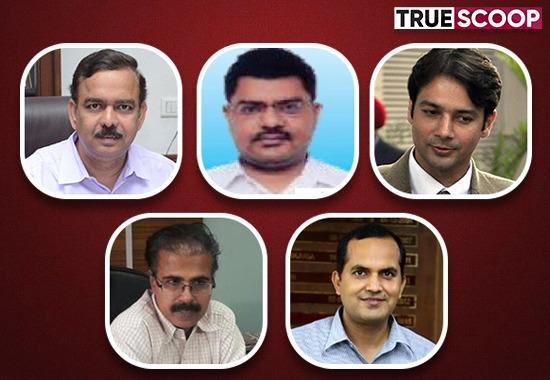In a major administrative reshuffle, the Punjab government on Saturday transferred 32 Indian Administrative Service (IAS) officers. AAP transferred its important IAS officers. Here is the full list of the officers transferred:
1. A.Venu Prasad, 1991 IAS is appointed as additional chief Secretary to chief Minister, Punjab and in addition Additional Chief Secretary, New and Renewable Energy Sources.
2. Vivek Pratap, 1996 IAS officer is appointed as principal secretary local government.
3. Varun Roojam, 2004 IAS is appointed as excise commissioner.
4. Krishan Kumar, IAS has been posted as Principal Secretary, Water Resources, with additional charge of Principal Secretary, Mines & Geology, Punjab
5. Kamal Kishor Yadav, IAS (2003) posted as Taxation Commissioner.
6. Ravneet Kaur, IAS (1988) is posted as Special Chief Secretary-cum-Financial Commissioner.
7. Vijay Kumar Janjua, IAS (1989), posted as Special Chief Secretary, Jails.
8. Anurag Agarwal, IAS (1990) posted as Additional Chief Secretary-cum-Financial Commissioner, Cooperation.
9. Seema Jain, IAS (1991) appointed as Additional Chief Secretary, Social Security, Women and Child Development.
10. Sarvjit Singh, IAS (1992) is posted as Additional Chief Secretary, Agriculture and Farmers Welfare.
11. Raji P. Shrivastava, IAS, appointed as Additional Chief Secretary-cum Financial Commissioner, Forests and Wildlife and in addition Additional Chief Secretary, Food Processing.
12. KAP Sinha, IAS (1992) posted as Additional Chief Secretary-cum Financial Commissioner, Taxation.
13. Anurag Verma, IAS (1993) posted as Principal Secretary, Home Affairs & Justice and in addition Principal Secretary, Public Work Department.
14. Kakumanu Siva Prasad, IAS (1993) transferred as Financial Commissioner, Rural Development & Panchayats.
15. Vikas Pratap, IAS (1994) posted as Principal Secretary, Finance
16. Alok Shekhar, IAS (1994) posted as Principal Secretary, School Education
17. Dhirendra Kumar Tiwari, IAS (1994) posted as Principal Secretary, Water Supply and Sanitation.
18. Tejveer Singh, IAS (1994) appointed as Principal Secretary, Power.
19. Jaspreet Talwar, IAS (1995) posted as Principal Secretary, Higher Education and Languages.
20. Hussan Lal, IAS (1995) posted as Principal Secretary, Medical Education & Research.
Also read: AAP MP Harbhajan Singh pledges to contribute his RS salary towards education, welfare of Farmers' daughters
21. Dilip Kumar, IAS (1995) posted as Principal Secretary, Employment Generation and Training.
22. Raj Kamal Chaudhuri, IAS (1996) posted as Principal Secretary, Sports and Youth Services.
23. Ajoy Kumar Sinha, IAS (1996) posted as Principal Secretary, Housing and Urban Development.
24. Rahul Bhandari, IAS (1997) posted as Principal Secretary, Technical Education & Industrial Training.
25. Veerendra Kumar Meena, IAS (1997) posted as Principal Secretary, Freedom Fighters.
26. Vikas Garg, IAS (1998) transferred as Secretary, Transport.
27. Sumer Singh Gurjar, IAS (1998) transferred as Secretary, Labor.
28. Nilkanth S. Avhad, IAS (1999) transferred as Registrar, Cooperative Societies.
29. Ajoy Sharma, IAS (1999) posted as Secretary, Health and Family Welfare.
30. Rahul Tiwari, IAS (2000) posted as Secretary, Science Technology & Environment.
31. Rajat Agarwal, IAS (2003) posted as Secretary, Personnel and in addition Secretary, General Administration & Coordination and in addition Secretary, Vigilance.
32. Malwinder Singh Jaggi, IAS (2005) posted as Secretary, Civil Aviation and in addition Secretary, Information and Public Relations.
Vivek Pratap Singh, IAS, has been appointed as the Principal Secretary Local Government because he is one of the upright officers. He worked in the local body of the system and the AAP government wants to control the corruption in the state. The government has transferred him in order to control corruption.
Varun Roojam, IAS, the excise department has been given to the IAS because it is a very important issue of Punjab and Varun is good in handling the administration work. There is a huge leak in the revenue of the Punjab. The state needs the revenue generated to fulfills its expenditure.
